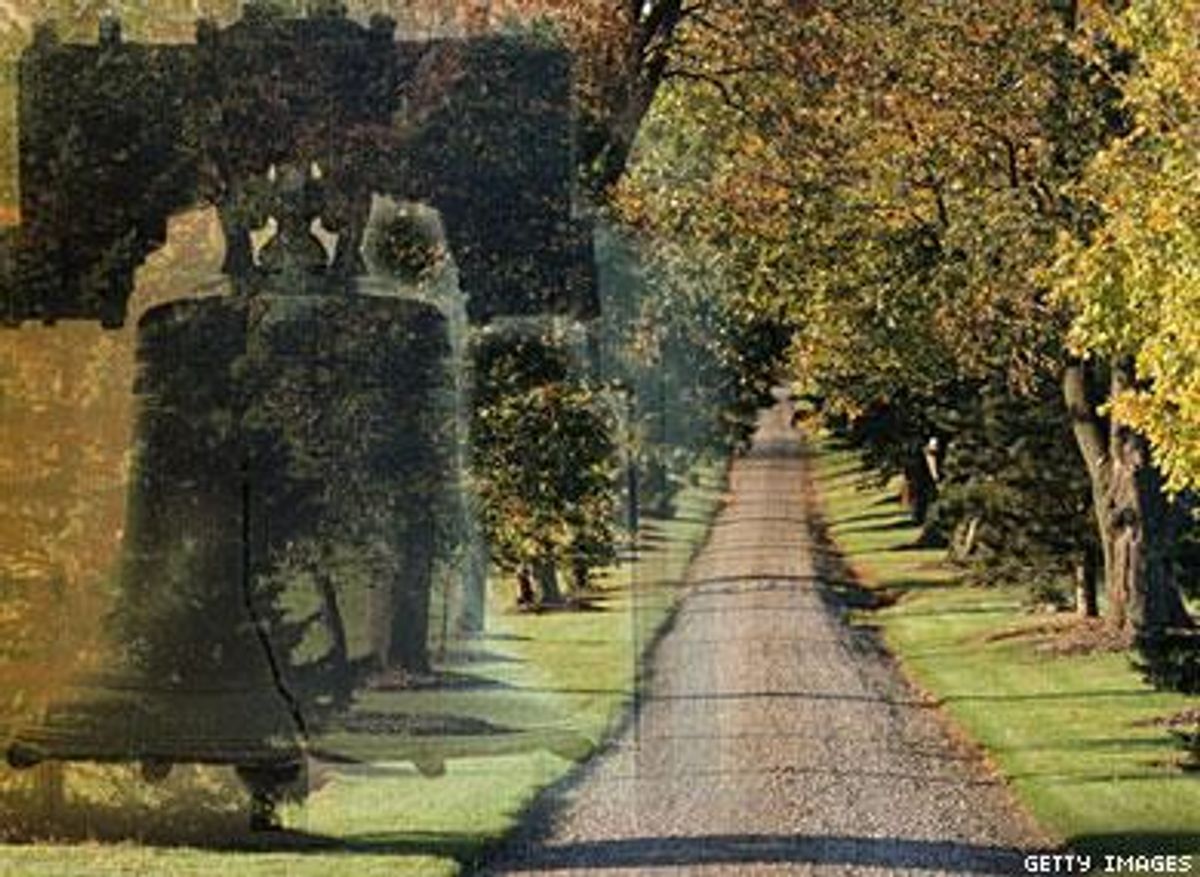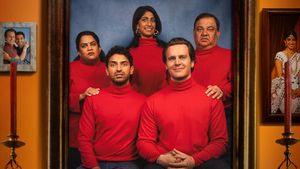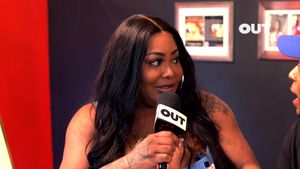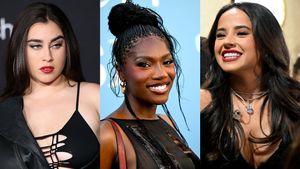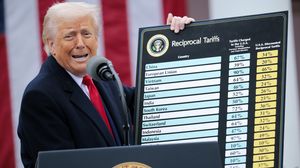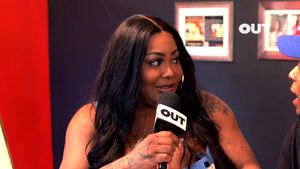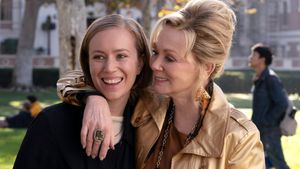It was around 8
a.m. last Saturday when a troupe of about 35 New York
City lesbians and several men piled into a bus bound for
Philadelphia, where they had signed up to knock on
doors in an effort to get people to the polls for
Barack Obama next Tuesday.
"It's one of those elections where 20 years
from now people will ask me where I was, and I want to
have an answer," said Katie Kelly, 24. The
proclamation immediately inspired a protest from her
26-year-old girlfriend, Elspeth Greene. "Hey,
that's my line," Greene said, as they
stood next to each other in matching "Obama for
President" T-shirts, one purple and the other
green.
Pennsylvania has
become increasingly important as John McCain pulled
resources out of other states such as Michigan and Wisconsin
that voted Democratic in 2004 to concentrate his
efforts on winning the Keystone State's 21
electoral votes. Most recent polls there show Senator Obama
with anywhere from a 7- to 14-point advantage, but
McCain's advisers have argued that voting
trends in the state are sometimes unpredictable and
that it's their last, best chance to steal a
"blue state" from Obama, even as the
U.S. senator from Illinois threatens to flip a handful of
key red states such as Ohio and Florida.
Bus organizers
Erin Drinkwater, 28, and Tanene Allison, 27, said the road
trip was the second stage of a grassroots effort to get more
LGBT women involved in the campaign. "The
strategy was, How do you get new people engaged in the
campaign and destigmatize canvassing -- make it fun, make
it accessible?" Allison said, as the cult classic
But I'm a Cheerleader played in the
background on the bus's video system. The
three-step plan had started with a canvassing sign-up
party held at a local lesbian bar called
Henrietta Hudson the previous week, and the daylong
commitment to walking Philadelphia was actually a baby
step on the way to a bigger request -- who
might be willing to spend the three or four days leading up
to November 4 walking neighborhoods in a swing state
like Ohio, where Allison planned to be.
When the movie
ended, Drinkwater and Allison offered a mini training
session. People would pair up and be provided with a
"walk kit" that included a map of the
area they were to canvass, the exact addresses of the
doors they should approach, and the names, ages, and party
affiliations of the people who lived there. At this point
the campaign had enough intel about each area to know
where Obama supporters were and who might still be a
fence-sitter, but McCain backers would be skipped
altogether. The main priority was motivating the right
people -- Obama folks, in this case -- to the
polls, especially since Pennsylvania has no
early-voting option.
"The
campaign tries to make four contacts with voters before
Election Day -- the constant contact is what
gets people to vote," explained Allison.
Volunteers were to mark down whom they spoke with, confirm
whom that person planned on voting for, and urge them
to vote. "The campaign will know who to target
on Election Day based on what we do," said Allison.
And if people
seemed particularly enthusiastic, they should be given the
opportunity to work with the campaign. "If people are
interested in volunteering, there's plenty of
ways to engage them in their comfort zone,"
said Drinkwater. "They can make phone calls without
ever leaving their home."
New York, a
reliably blue state, has provided a rich well of volunteers
to Pennsylvania throughout the primaries -- when many
New Yorkers canvassed for Hillary Clinton --
and now into the general election for Obama. According
to campaign aides, one or two LGBT-specific buses have
been shuttling back and forth from New York to Philly ever
since September 27 -- about eight in total
(though the Henrietta Hudson bus, sponsored by local
activist Yetta Kurland, was not officially coordinated
by the campaign.)
It's all
part of a massive volunteer effort in Pennsylvania,
but campaign officials aren't divulging
any numbers. When the group of women arrived at
the Germantown field office, spilling out of the bus
and onto the sidewalk, passersby knew exactly who they were
and from whence they had come. "Thank you, New
York!" one man offered spontaneously.
The Obama field
office, one of 81 across the state that total
about 700 staffers, was a bustle of activity --
from the "check-in" station up front, to
an intensely focused crew of phone bankers
with eyes glued to their call sheets, to a coordinator
who was tracking their get-out-the-vote efforts for
the day. The women were quickly given their marching
orders and dispatched. Drinkwater paired up with one
of the group's 15 first-time canvassers, Melissa
Hooper. "This is so exciting," she
enthused as the two approached their first door on
Queens Street. "This is my first time to do
this...ever!"
Germantown is a
predominately African-American area, with a mix of
Indian-Americans and lesbians and socioeconomic strata
varying from blue-collar to middle-class. Drinkwater,
a congressional aide by day, said she had worked a
similar neighborhood the week before in Pittsburgh
-- highly Democratic but with traditionally low
turnout on elections. "The people there were so
pumped," she said, adding that it was sort of a
nervous excitement. "You got the sense that the
community wasn't really sure -- Can this
really happen? Is this really going to
happen?"
As the two white
women weaved their way through the streets, they met
with a similar dynamic. Most people had already encountered
campaign workers and had quick answers for them.
"We're ready," Beverly Banks
offered immediately, while she and her family unloaded
groceries from their car. "I've voted in
every election since I was 18, whether I knew who was
running or not," she jested.
Banks patiently
listened as Drinkwater ticked off the list of folks
living at the address, confirming who was registered and who
was voting, including her own three daughters. Then
Banks proudly added that her youngest daughter,
Alicia, was 33 and would be voting for the very first
time in this election.
Another
33-year-old who planned to vote for the first time was
Beatrice Harris. With tattoos ranging from paw prints
to names and geometric symbols lacing her body from
head to toe, Harris, donning a bright red
"Obama for President" hat, declared her love
for the candidate.
"I have
this huge poster of him over my bed," she said,
approximating how big it is as her hands drew an
imaginary square against the wall. "I think my
boyfriend's a little jealous of him, actually."
Harris had been volunteering for the campaign, the
first time she had been involved in the electoral
process in any way. "This is something I will never
ever forget," she said.
Oliver, a white
20-something who declined to give his last name, was the
closest Drinkwater and Hooper came to encountering an
undecided voter in their 12-block radius. He answered
the door chatting on his cell but got off the phone to
engage. He said he wasn't sure whom he was voting for
but quickly followed with "I'm not voting for
McCain." As Drinkwater prodded him a bit about
his hesitations with Obama, Oliver didn't name
anything specific. "I might just vote for Ron Paul
because he's independent," he concluded.
Back at the field
office several hours later, the volunteers checked in
their walk kits so the new data they had gathered could be
entered into the computer system that night. As the
band of women assembled to get back on the bus, field
office volunteers broke into an "I love New
York" chant.
During the 2
1/2-hour bus ride home, Drinkwater and Allison facilitated a
group debriefing. Feedback was overwhelmingly positive.
"It's really moving to connect with
people about something so important," said Miranda
Massie, a 41-year-old straight ally who was on the bus.
Athena Reich,
32, told the group how she had managed to get the
phone numbers of 11 new volunteers for the campaign in one
day -- a record, according to field office workers.
"I just asked people if they wanted to
volunteer, and if they said no, I would say, 'But you
can change the world.' "
Claudia, a
29-year-old Romanian who preferred not to give her last
name, participated even though she is not eligible to
vote on Tuesday and remarked at what an unusual
opportunity it was to engage at random with other
people in this country. "Americans in general are so
private," she said. "Being so close to their
premises and reaching out to them -- it's
something that doesn't happen so often; it's
very rare."
Based on the
number of walkers that day and the average number of doors
and contacts that people typically make, Allison estimated
that they had knocked on roughly 3,200 doors
altogether and made about 1,600 contacts (though
Drinkwater and Hooper's route yielded less than a 50%
contact rate).
But more
importantly, Allison asked for a show of hands as to who
planned on canvassing in a swing state and who else
might be ready to sign up. Of the 35 volunteers, nine
had already committed to going and 12 more said they
would be interested in doing so.
Allison took her
seat and reflected on their experiment in attracting new
Obama recruits. "It worked," she beamed.
